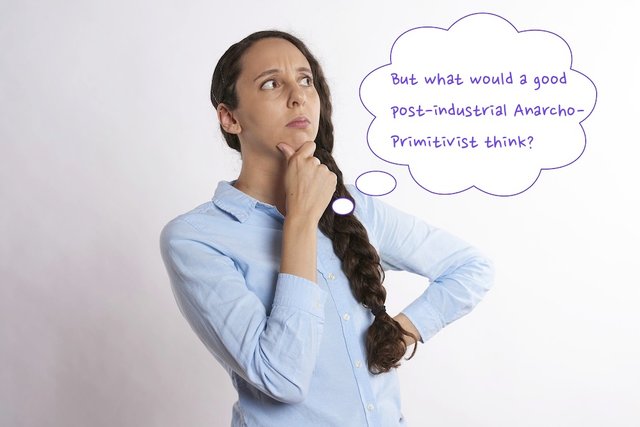Be a critical thinker, not a polarised echo chamber
Polarisation is the enemy of critical thinking.
What do I mean by polarisation? Polarisation of opinion, when people adopt views according to their political ideology – left or right; capitalism or Marxism; progressive or reactionary. When they don't allow themselves to think outside the confines of these ideologies.
Usually they furiously deny that this is the case – and their angry denial confirms that they are doing exactly that.
This type of thinking is not restricted to politics. Many people who see themselves as independent journalists cling just as tightly to ideologies popular in the alternative media world as political ideologists. If they read or hear something being circulated by another apparently “awake” writer or broadcaster, they will happily repeat it on their own blog, often accompanied with outrage, without bothering to check the facts.

Source
This isn't the case with all independent journalists, and it's generally the ones who actually question the narrative – whether it's the mainstream or the independent narrative – who become the most popular, because they are leading the thought, not following it.
We all do it!
We all fall into the trap of polarised thinking from time to time – often when we feel passionate about something. I sometimes find myself having to pull away from my own inbuilt ideological prejudices to accept a new idea. I really do try to challenge myself to do this, which is not always easy, but it can be rewarding.
I've changed a lot over the years. I was brought up in a family with very left-leaning beliefs, which I generally adopted. But I was always the rebel in the family, and from a young age I would try… not so much to shock as to confound my family, by declaring thoughts that deviated from this traditional left-wing standpoint.
When I was a child I started to think that the UK Conservative leader Edward Heath had some good ideas. This utterly shocked my parents, and I looking back, how wrong I was! Not that the Labour leader was any better… These days I rarely trust ANY politicians!
When Margaret Thatcher came along, she incensed me and I swung back to my family's lefty stance. I was too young to vote at the time, and that incensed me even more!
After 18 years of political anger and frustration, MY side finally came into power, with the Labour government of Tony Blair. I wasn't able to vote, as I'd been out of the country for over a year and hadn't registered in time, but I celebrated the Labour win at an election party at my sister's house. I made Margaritas for the occasion. We were elated!
But for me, the sheen soon came off Tony Blair's government. I'd never really taken to him anyway, and called him Tony Bleugh even before he became Labour leader. I went off "New Labour" long before the Iraq War, and I started voting for smaller parties, like the LibDems, the Greens and the SNP (Scottish Nationalist Party).
Blind puppets
For a long time I continued to think that Bill Clinton could do no wrong, and that his detractors were just politically-motivated. Not living in the US, I saw things from a distant perspective, so I allowed myself to remain caught up in the left-right paradigm. I now see this as one of the worst types of political manipulation. Left-right politics turns intelligent people into blind puppets who will agree to almost anything if it's the policy of "their side". It cleverly pits people against each other, instead of the politicians and corruption they should be investigating or attacking.
Referendums are also designed to politically polarise people. I don't think I'll ever vote in one again, after the referenda on Scottish Independence the EU. Both were characterised by very negative propaganda that got people attacking each other and even broke up friendships. People who voted for Scottish Independence were characterised in the media as anti-English militants, and those who voted to stay in the UK were portrayed as narrow-minded bigots.
Divide and rule
People who voted "Leave" in the EU referendum were portrayed in the mainstream media as xenophobic racists and immigrant-haters, with the other arguments for leaving the EU – including the "Lexit" campaign (left-wing Brexiters) – simply ignored.
Many Leave voters merrily joined in the "divide and rule" game by hurling back insults at people who voted Remain.
There's no critical thinking in a situation like this. And it starts with the politicians and their spin-doctors. The EU referendum script was particularly biased. It said: "We're graciously allowing you to have your say on this issue! Your opinion counts! You can vote either way you want – but if you vote 'Leave', you're a backward-looking racist."
That's the 21st century version of democracy, played out ad nauseum in the establishment media, like BBC Radio 4 and The Guardian newspaper.
Few people who voted in the EU referendum have any idea about how the EU works, what issues are governed by the EU or even who their MEP is. Those important issues were submerged in a flood of emotive propaganda in the run-up to the vote.
Agree with us! Or else...
Polarisation of thought is not confined to politics, and it has been moving in some very disturbing directions recently. President George W Bush famously said, "You are either with us, or you are with the terrorists." That kind of thinking allows no room for critical thought. You have to go along with what "your side" does, no matter how unjust – or be branded a terrorist.
The same kind of manipulation operates in the Israel-Palestine conflict. People who protest against the aggression of the Israeli government are characterised as anti-semitic. Even Jewish activists like Gilad Atzmon and Jackie Walker have been described as "anti-Semitic" for not adhering to a particular established script.
Witness this opinion piece, published in The Guardian in 2011, which opens by discussing Gilad Atzmon, describing some of his writings as anti-semitic simply because of his opinions on "Jewish Marxism". It then randomly introduces a woman who has no connection with Atzmon, but who allegedly argued that the idea that Jews kill Christian children has some basis in fact.
The article thereby attempts to lump together the views of Gilad Atzmon with an outrageously anti-semitic viewpoint. Many people will just casually drink this up, as it is the viewpoint of their side. They are too scared to dare express any disagreement, in case they too are tainted with being anti-semitic.
On the other side of the coin, there are people who will casually accept the idea that Jews kill Christian children – because that is the viewpoint of their side. This kind of "groupthink" can lead to the acceptance of outrageous extremes. It can potentially lead otherwise humanitarian people to sanction the types of war and atrocities that we're all too familiar with.
Step outside the established narrative
It's so important to step outside the established narrative, to question everything. It's much more comfortable – especially when things seem a bit scary – to surround yourself with people who share the same viewpoint as you do, and who will always support and confirm your opinions. But it's actually more fun and more stimulating to exchange views with people who think a little differently than you. That's how you learn new things and develop as a person.
How to think critically
• Think of one person or thing that you have massive admiration for. It could be a public figure or a political party, a group or a concept such as science or voluntaryism. Then think of at least one negative trait that this person or idea or thing displays. If you can think of two or three negative aspects, your critical thinking skills are probably well-honed.
• Think of one person or thing that you absolutely loathe or have no respect for. Again, it could be a public figure or a political party, a group or a concept. It could be left-wingers, or Trump supporters. Then think of at least one positive trait that this person or idea or thing displays. If you can think of two or three positive aspects, your critical thinking skills are probably well-honed.
Don't try to find more than two or three positive or negative things – this exercise isn't about seeing everything as equally negative or positive, in a wishy-washy way. It's about getting over hero worship and slavish devotion to a cause; being brave enough to remove your rose-tinted specs and to see things as they actually are. It's about daring to step outside the cosy refuge of the beliefs and support of your tribe.
It's about being an individual.
.gif)





Political ideology is such a useless mind numbing phenomenon. For any true critical thinker it should be nearly impossible to categorize oneself as any sort of political affiliation. Politics cannot be one size fits all which is why it is complete and total absurdity in the first place. No grown ups should need nor look to any other grown ups to give them permission to be grown ups. That's my two cents. Good post!
Thanks @movement19. You make some great points here, which a few years ago would have horrified me... I probably would have said, "People died for democracy!" These days I think that this sham of a "democracy" is not what they died for.
Very well articulated and thought provoking post. I agree that it is so very easy to get swept up in the crowd mentality and lose the ability to think.
A talk show host in Austin, Texas who I could not stand to listen too taught me a very valuable lesson on confirmation bias and that fits right in here with how only hearing the side you align with is not healthy for critical thinking.
I hope this post is shared for and wide across the platform, I will be re-steeming it after I post this reply.
Thanks.
Thanks for your support @sultnpapper. Confirmation bias - excellent term. It's an insidious problem, because when you think you're right you're more vulnerable to this way of thinking, so it often affects people who are the most educated and intellectual.
I remember in the 1990s during the Clinton presidency hearing a late night BBC World Service report on a US bombing of Iraq, and thinking "Well, Bill Clinton must have a good reason for doing that" and then falling asleep. A small part of me must have been questioning it, because the memory has stayed with me all these years. It makes you twist your mind in dangerous ways just so you can rest assured that right is on your side.
I'm so glad I got out of that way of thinking, and I really try to watch myself because it can be easy to fall back into it.
Bill Clinton is a master at nonverbal communication. I learned about him when he was governor of Arkansas and running for re-election . He told the people, "I have no other aspirations for higher office, if you elect me again I assure you I will fulfill my entire term". Two weeks after he was sworn back in after being re-elected as governor he announced he was running for president. So for two years he collected a paycheck from the state, used "state business" trips and state money to campaign for president.
If you visually watch him when he is speaking he will get you to believe every word, if you just close your eyes or listen on the radio where you can't see his person I would find myself calling BS on what he was saying. He knows the right body movements to use to sell you and you never even realize it as it happens.
He has made quite a fortune for the "Clinton Foundation" doing exactly what I have said in how he can sell people a pack of lies because most of those donations come from people "meeting" with him.
I learned the term "confirmation bias" from someone who was completely opposite from my way of thinking only because I was to lazy to change the radio station for an hour between the programs I wanted to listen too. I learned a real valuable lesson in those hours each day.
I would highly suggest that people take the time to listen to other side every now and then, not the reporting of what the other side is saying. There is a big difference in most cases of what is being said and what is being "reported" as being said.
Re-confirmation bias - I totally agree, and it's not always an easy thing to do. I'm definitely going to write more on this subject.
Re-Clinton - that's a good point about the nonverbal communication, and I think many successful political leaders have this down to a 'T'. Obama is a mesmerising speaker who also uses his eyes to project sincerity, but his words were rarely followed by action (in my opinion). Margaret Thatcher also used nonverbal communication very well, especially with her eyes. I think Tony Blair was unconvincing, and as for Donald Trump...
Amazing write up @natubat and very interesting topic...though i thoroughly agree many of our decision are influnced by the charm and influence of other..which is wrong..a deciaion must be made after own thpight process.
Thanks @steemflow! Really glad you appreciated my thoughts.
Congratulations! This post has been chosen as one of the daily Whistle Stops for The STEEM Engine!
You can see your post's place along the track here: The Daily Whistle Stops, Issue #152 (6/1/18)
The STEEM Engine is an initiative dedicated to promoting meaningful engagement across Steemit. Find out more about us and join us today.